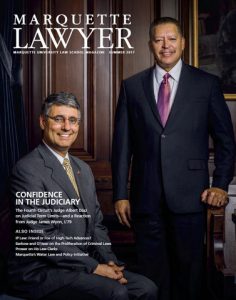A Day of Insight on Major Environmental Topics — and Proper Garbage Disposer Use
The sharing of thoughtful expertise on matters of great long-term importance – that was the virtue and strength of a conference at Marquette Law School on May 16. “Innovation at the Food-Energy-Water Nexus” brought together about 75 professionals and academic figures from across Wisconsin and the country who work in these tightly related fields.
The day-long session, organized by David Strifling, director of the Water Law and Policy Initiative at Marquette Law School, and an organizing committee, had a broad theme of how leaders and researchers in these crucial fields could work together and stretch their vision to serve the best and broadest sense of the public good.
Speakers at the event covered a variety of topics including energy recovery at wastewater treatment facilities, the importance of groundwater, ethical aspects of decisions about natural resources, and the deep links between agriculture, water, and energy. Yet for the handful of people in the audience who were less technical in their backgrounds — and for a larger audience such as this one – the most practical piece of wisdom may well have been a bit of advice on how to use a garbage disposal.
In the question and answer session at the end of a panel discussion on environmental issues, one of those non-technical people in the audience (no, it wasn’t me, but I had the same question on my mind) asked if it was better for the environment to put your food waste into your garbage disposer, sending it to a wastewater treatment facility, or into your garbage, sending it to a landfill. She said her garbage disposer sometimes got clogged, causing flooding in her basement, so she stopped using it.
One of the panelists was Michael Keleman, manager of environmental engineering for InSinkErator, a leader in the garbage disposal field. The company is headquartered in Sturdevant, in Racine County. Not surprisingly, Keleman is partial to garbage disposer units and putting most food waste down the sink.
He told the questioner, “It seems like people, when they have problems, it’s probably from improper use. That’s this: They’ll load up the chamber or the sink and say, ‘Oop, it’s time to use the disposer, my sink’s getting full, it’s running over the top.’ They’ll turn the disposer on and then they’ll turn the water on and then, as soon as they see the food and water disappear, they’ll turn the water off and the disposer off.
“What you really want to do is turn your water on first, then turn your disposer on second, and then add your food waste gradually. Let it grind until you don’t hear any food waste any more. Turn the disposer off and let the water run for a few seconds.”
So is it better to do that than throw your waste in the garbage can? Keleman said food waste is 70 to 90 percent water. “Why are we handling this as a solid waste?” he asked. “It’s not really solid any more if you’re using the disposer right.” Its density is about the same as water and it will be successfully transported to a treatment facility that can recover resources – including clean water and energy – from it, and simultaneously avoid land use problems.
Keleman had less cheerful advice on a second matter raised by the questioner, avoiding disposing of unneeded drugs by flushing them down the toilet or sink.
While saying programs to dispose of pharmaceuticals by other means are “great,” Keleman was skeptical of how much difference they make.
“We take in these pharmaceuticals, we excrete back over 90% of it,” he said. “The bottom line is, as long as pharmacy is the way it is, we’re going to excrete most of these endocrine disrupters and birth control pills, even caffeine, all the things – the pain killers, benzodiazepines. These are all things our society is taking and we’re excreting. So no matter how good a job we do at take-back programs, they’re still going to be this in the waste water stream.“
In Keleman’s accounting, score one for proper use of a garbage disposer. And do what you can about disposing of drugs – but don’t have illusions about I in a society where drug use is so extensive.
To read the program for the conference, click here. To watch video of the entire conference, click here. The exchange with Keleman starts at 5 hours and 14 minutes into the video. ##

 Two pairs may not be the most powerful hand in poker, but they are definitely a winning combination for the Summer 2017 edition of Marquette Lawyer, the Marquette Law School magazine.
Two pairs may not be the most powerful hand in poker, but they are definitely a winning combination for the Summer 2017 edition of Marquette Lawyer, the Marquette Law School magazine.